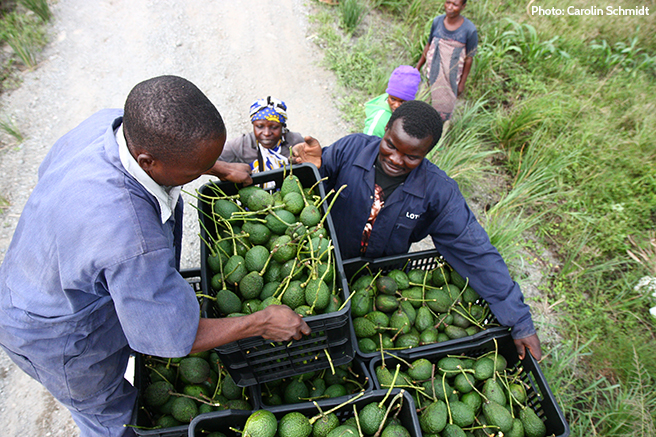The Conservation Opportunities of Growth Corridors

A wheel can take you forward, or it can take you backward. The direction depends on how you roll it. Growth corridors are similar to wheels in that they can take you forward or backward depending on how they develop.
Simply speaking, a growth corridor is an innovative way to finance regional development and lift people out of poverty. It is the result of public-private partnerships that work across entire value chains of an industry such as agriculture or mining, and oil and gas, to improve efficiency through targeted investments. This can even be applied as a development model for tourism.
A recently released study takes a welcome look at 33 existing and proposed growth corridors in Africa from the perspective of potential impacts on wildlife and people. While the study highlights important issues that must be addressed by those promoting the corridors, the conclusion that some of these corridors should not go ahead is unrealistic and misguided. Growth corridors should always be designed and carefully managed to ensure they take development in the right direction. If it appears that a growth corridor will negatively impact the environment and local people, the corridor should be redesigned, not scrapped altogether. Development in Africa must and will happen, but it can happen in a way that is sustainable, whereby the integrity of ecosystems are maintained and the lives of people across the continent are improved. These growth corridors are an important part of that development model and should be embraced as a vehicle for delivering a bright future for Africa.
In Tanzania, AWF has been working in one such growth corridor called the Southern Agriculture Growth Corridor of Tanzania (SAGCOT), which sits in an area of the country that is home to three landscapes renowned for their wildlife populations: the great Selous Game Reserve, long famous for its large elephant herds but more recently recognized as a hotbed of elephant poaching; Ruaha National Park, one of Africa’s largest parks; and Katavi National Park, whose natural treasures are under threat from unplanned, unregulated and uninspired development. Sprawling urban settlements and underproductive and unsustainable agriculture have crept gradually into forests, wetlands and grasslands, closing off wildlife corridors, polluting rivers, and denuding hillsides. Here, the absence of planned development is causing biodiversity loss and leaving people in poverty.
Since AWF began working in SAGCOT, the idea has been to demonstrate how growth corridors and agricultural investments can strengthen, not undermine, wild lands. SAGCOT presents the opportunity to harness the reins of development and take it in the right direction by focusing attention on clustered investments in agriculture, tourism, transport and processing across the region. SAGCOT is creating the enabling framework for businesses big and small to work together to build viable value chains that will help African nations continue to thrive in today’s global economy. AWF’s role is in ensuring that that enabling framework includes safeguards for the environment, and on-ramps for communities to ensure they are benefitting from the economically robust and ecologically resilient future that emerges.
An example of how well-planned and managed investments can benefit both wildlife and the environment can be seen through AWF’s work with the Rungwe Avocado Company, a sustainable agriculture enterprise that sits within Tanzania’s agriculture growth corridor and which received financing through AWF’s impact investing subsidiary, African Wildlife Capital. AWC provided a loan to Rungwe to support an environmentally sustainable growth and export project for avocados. Under the terms of the investment, the company is bound by certain conservation covenants that ensure the company intensifies avocado production in a limited area to increase yield and limit agricultural sprawl. At the same time, Rungwe engages the agricultural services of local farmers, simultaneously increasing income to local communities. Growth corridors present the opportunity to bring such examples to scale.
In this same way, AWF is embedding landscape-specific conservation measures into agricultural outgrower value chains involved in production of everything from sugar and rice to teak and tomatoes. We start with a sound understanding of the conservation imperatives in a landscape, and then work with the companies already active and investing in the area to design conservation measures that are necessary to protect ecological systems. We then work with development partners and the private sector to invest in ways that provide better livelihood opportunities for the household farmers while at the same time ensuring their activities are in concert with the needs of the surrounding environment, thus building a system of sustainable and inclusive economic growth.
Let us not throw out the wheel of development simply because we perceive it to be moving in the wrong direction. Instead, let conservationists, governments and the private sector work together to turn the wheel in the right direction.
Starting this week, Kenya is hosting the 10th World Trade Organization Ministerial Conference—a first for the country and the continent. Building on the International Centre for Trade and Sustainable Development (ICTSD)’s twenty-year history of encouraging innovative thinking on trade and sustainable development issues at WTO Ministerial Conferences, this year’s Trade and Development Symposium (TDS) in Nairobi will act as a crucial platform for intellectual enquiry and dialogue on the future of the multilateral trading system.
Part of the TDS, the 1st Forum on Trade in Nature will be organised in parallel with the Ministerial Conference. Supported by AWF, it will explore the potential for and challenges associated with sustainable trade in natural resources (in particular fish, trees, other wildlife, and ecosystem services) and its role in supporting different aspects of sustainable development, including environmental sustainability and health, livelihoods and inclusive economic growth, governance and the rule of law. To stay up to date with the latest developments from the Forum on Trade in Nature, follow AWF on Facebook and Twitter, and tune in to the tag #TDSNairobi.